Daily
No Excuse for Donen Absence
Last night’s death-reel sequence ran 4:21, but the cavalcade of faces only lasted for 3:29. It began with Susan Anspach at the 24-second mark and ended with Albert Finney at 3:43. The Academy had a little less than a minute’s worth of wiggle room. They surely could have fit in the great Stanley Donen, who passed the day before yesterday.
I know enough about editing and re-editing a video piece that adding a single visual element isn’t a big deal these days. If they had wanted to include Donen, they could have done it. They were lazy, plain and simple.
And while they were at it, they could have included Andy Vajna, Gary Kurtz and R. Lee Ermey. I understand about omitting Carol Channing — she was a Broadway gal.
Gleiberman’s Final Word
In the eyes of history, the SJW toxics (or, if you will, the virtue-signalling Stalinists) lost last night. Their bullshit is evaporating into vapor as we speak. They can stomp and whine and punch the refrigerator all they want, but Green Book took all their slings and arrows and won the Oscar anyway.
But before we put this stinking battle to bed, a final word from Variety‘s Owen Gleiberman, who liked Green Book as much as I did and lamented the relentless p.c. putdowns:
“Set in 1962, Green Book is a feel-good liberal buddy movie that’s like a cross between Driving Miss Daisy and Rain Man, and 20 years ago it would have been a slam-dunk Oscar triumph.
“But it came up against a newly purist and progressive mindset, one that said, in essence: If you take a white character’s struggle and make it the moral/spiritual ‘equivalent’ of a black character’s struggle, you’ll be saying that the pain of the oppressor is equal to the pain of the oppressed — and that, in itself, is a racist lie.
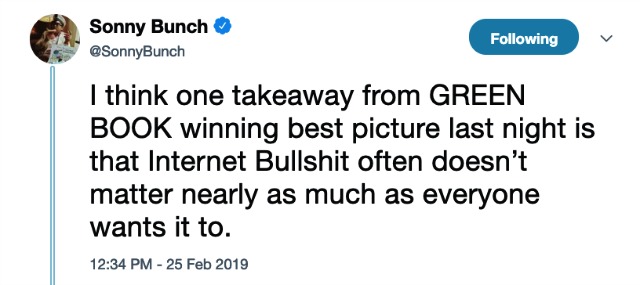
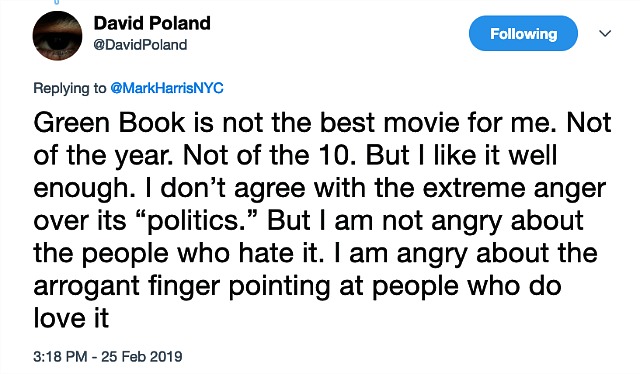

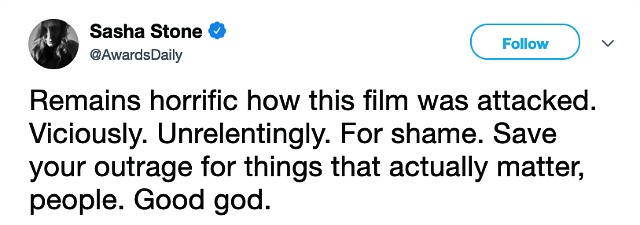
“As someone who believes that Green Book is a powerful, moving, and emotionally complex film, I’d push back against that argument by saying: The movie isn’t equating the experience of black oppression and white blindness. It’s saying that they co-exist in the world — and that for the purposes of this movie, it will give them equal screen time.
“My point here is not to re-fight that fight; it’s simply to say that Green Book is a film that got transfigured in the culture. It started off as unabashed liberal comfort food; it ended up as a movie that divided as much as it united. It became a political hot potato, and so voting for it wasn’t simply like pulling the lever for Driving Miss Daisy or Rain Man — for the kind of intimate and uplifting relationship-of-opposites heart-tugger that has often triumphed at the Oscars. Voting for it became, at least for some Academy members, a political act in a different way: a knowing defense of what’s left of the Hollywood status quo. It became a rebellion against the rebellion.
“You could say, of course, that the victory of Green Book came down to one elemental thing: A lot of people in the Academy really loved Green Book. Fair enough. But my point is that its win last night still played as an upset, as the triumph of the underdog.
110% Agreement
“Without a host to guide the writers’ room, the banter doled out to presenters can feel a bit aimless. Trust Awkwafina and John Mulaney to make so much of their time presenting two short films that viewers at home were surely asking, ‘Why didn’t they host?’ From the nerves they cutely faked to the surprise they evidenced when, yes, they got to present a second category, let this be considered their audition tape for next year.” — N.Y. Times “carpetbagger” Kyle Buchanan in a 2.25 “Oscar’s Best & Worst Moments” piece.
Game Is Hopelessly Rigged
In the view of writer Joelle Monique, Green Book had to be racist because it was made by white guys. The fact that Mahershala Ali was easily as much of a strong collaborator as director Peter Farrelly cuts no ice with her. She’s basically saying that no matter how you slice it, “dominant white guy input” guarantees racism, or certainly a lack of a fair perspective.
Which is another way of saying, in a broader sense, that in any realm white-guy dominance can come to no good end because white culture has been historically incapable of fairness or justice, and is not likely to change its spots. There is abundant truth in that viewpoint, but on the other hand what are amiable, well-educated white guys supposed to do?
The basic idea is that even well-educated, urban-residing fair-skinned folks who wear Bruno Magli lace-ups are fundamentally bad news no matter what. Maybe so. Hollywood Elsewhere regrets its whiteness as well as the unfortunate genetic inheritance that I was sadly cursed with when I took my first breath.
On the other hand I yam what I yam. I’m a curious, well-educated, fairly liberal dude…world’s full of guys like me. I say “please” and “thank you” all the time. I observe traffic laws and have good taste in music, and I watch TV with headphones when it gets late. I’m not going to kill myself anytime soon, and I’m going to work hard and try to be fair with everyone I run into. And if that’s not good enough for certain parties, tough.
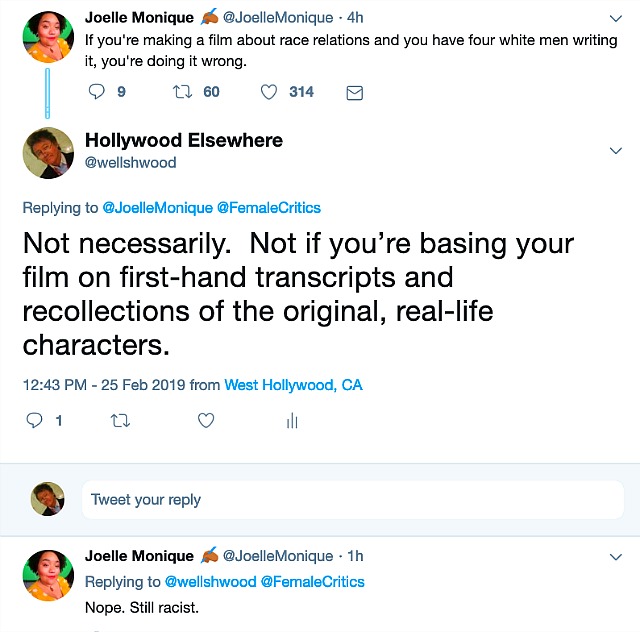
A Fairly Wonderful Thing
There’s no questioning the oft-shared observation that Green Book, winner of the 2019 Best Picture Oscar, is less than Olympian in certain respects. It’s no one’s idea of a complex film, and it’s a long way from classic arthouse fare. It’s a smoothly assembled, well-acted period dramedy that’s based on a true story — a 1962 road trip that actually happened, and which is based on first-hand recollections of the men who shared this experience — the late Don Shirley and “Tony Lip” Vallalonga.
It’s a parent-child relationship film that’s mainly about the child (Viggo Mortensen‘s under-educated goombah chauffeur) finding it within himself to take a couple of steps toward even-handed adulthood and compassion. That’s all it is — nothing more.
Director Peter Farrelly and his collaborators went after a certain chemistry, a certain mood. It delivers a genuine feel-good vibe — one that I felt in my gut when I first saw it last September in Toronto — and although it was clearly made in a familiar, carefully measured, commercially calculating sort of way, Green Book deals honest, upfront cards. The stellar lead performances by Mahershala Ali and Viggo Mortensen close the sale.
Alas, the p.c. left tried to kill Green Book over and over. Ask anyone in the Oscar-strategizing business — it was one of the ugliest attempted takedown campaigns in Hollywood history.
But Academy members, to their eternal credit, told the haters to stuff it. It’s not that I think Green Book is an especially brilliant or mesmerizimg film, or that it delivers a profoundly meaningful subcurrent or after-vibe or what-have-you, but the tears of joy that came to my eyes when it won are about the glorious decision by Academy voters to tell the Stalinist lefties and p.c. virtue–signallers to go fuck themselves…that they like or love what Green Book is about and how it made them feel, and to hell with the snooties.
For this reason alone this is a very happy night for Hollywood Elsewhere. The Academy flipped the bird to the haters, and that, to me, is a fairly wonderful thing.
For the record: Yesterday Tatyana predicted with absolute confidence that Green Book would take the Best Picture Oscar. She has a pretty good track record, so I just thought I’d mention this.
She also told me months ago that Cold War, which she loves, will never win the Best Foreign Language Oscar. Because, she said, “Americans are unable to understand what it was like to live under Communism, and the fear that ruled the lives of the two lovers (played by Joanna Kulig and Tomasz Kot) and penetrated their psyches. Cold War was a huge success with the European Film Awards voters (Best Picture, Director, Actress, et. al.) but not as much over here. Kulig’s character, Zula, is fueled by passion but deep down is a Slavic woman, a woman who wants to feel protected by her male partner. As much as she’s chemically attracted to Kot’s musician character, he didn’t make her feel this way.”
That “Green Book” wins best picture #Oscars like … pic.twitter.com/vCoOEysNLY
— It’s Mueller Time (@BookHookah) February 25, 2019
HE Oscar Pasta — Main & Final Course
8:07 pm: And Green Book wins the Best Picture Oscar. Producer Jim Burke: “We made this film with love, and with tenderness, and with respect.” I realize that Green Book isn’t quite made of the right cinematic stuff in some people’s eyes, and that it was/is, in some ways, a 1987 film. But words can’t describe how happy I feel that the p.c. haters were shut down but good by this. The rancid snobs and virtue-signalling reptiles were told to collect their overcoats and leave the room. The ugly crowd lost and a harmless, feel–good film won. Fuck you, assholes! Congrats to the whole team — Peter Farrelly, Viggo Mortensen, John Sloss…the whole gang. Hollywood Elsewhere was a Green Book pom-pom girl from the get-go, all the way back to Toronto.
8:07 pm: Guillermo del Toro hands the great Alfonso Cuaron (Roma) the Oscar for Best Director. Expected and predicted by everyone, bar none. “Gracias, gracias, gracias.” HE approves — who doesn’t?
7:56 pm: The Glenn Close moment is finally at hand. NO! Olivia Colman takes it! Total surprise. And on top of that, her Queen Anne character isn’t a lead role! The first LEFT-FIELD SHOCKER of the night. HE has admired Colman for years — congrats, hugs, cheers. One question: what happened to the Close inevitability? Nobody was predicting a Colman victory, certainly not since the Close blitzkrieg began at the Golden Globes a few weeks ago.
7:46 pm: And the Best Actor Oscar goes, as widely expected, to Bohemian Rhapsody‘s Rami Malek. His thank-you remarks are plain and simple. Thanks to everyone who helped make this moment happen, Malek says. Everyone, that is, except for a certain persona non grata who directed roughly 90% (more?) of the film, except for a week or two of shooting last January by Dexter Fletcher.
7:37 pm: They couldn’t slip Stanley Donen into the death reel? Announcement of the legendary director’s death was reported yesterday morning.
7:23 pm: Black Panther‘s Ludwig Goransson wins Best Musical Score Oscar. His acceptance remarks are brief and elegant. And, of course, A Star Is Born‘s “Shallow” wins the Best Song Oscar. Cue Lady Gaga’s tearful acceptance speech…voice cracking, hyperventilating, stunned, etc. It’s been her standard response to winning anything over the last couple of months.
7:12 pm: Green Book team wins the Best Original Screenplay Oscar. A friend (and fellow Oscar prognosticator) told me to change my prediction in this regard earlier today, and he was right. And the Best Adapted Screenplay Oscar goes, as expected, to BlacKkKlansman. Spike Lee finally lands on an Oscar telecast as a winner…finally takes the stage. And he reads from a hand-written speech on yellow note paper. This is our history, our heritage…remove Trump from the White House next year. Quote: “Let’s be on the right side of history. Let’s do the right thing. You know I had to get that in there.”
7:08 pm: The Skin guys take Oscar for Best Live Acton short. Nobody does reserved and dignified these days. They all do “whoa…ohmyGod..whoo-whoo-whoo!” And then they whoop it up again.
7:01 pm: Lady Gaga, wearing a $30 million diamond necklace, and Bradley Cooper sing “Shallow” on a mostly-bare stage. Excellent close-uo shot as the song concludes. Nice visual choreography.
6:57 pm: The Oscar for Best Visual Effects goes to First Man, which HE predicted on Gold Derby. Hats off to Damien Chazelle and the whole team.
6:45 pm: Bao wins Best Animated Short Oscar, and Period — End of Sentence (the sanitary napkins being manufactured in India that was partly produced by HE’s own Lisa Taback and her daughter) has won also. Here’s my HE review.
6:37 pm: A teaser for Martin Scorsese‘s The Irishman! A bullet casing, a little cigarette smoke, black backdrop…”I hear you paint houses.” I wanted a little taste of the digital youth-ing of Robert De Niro…just a two-second taste. But no.
6:31 pm: The Best Animated Feature is won by Spider Man: Into The Spider-Verse. Totally predicted by everyone but fine…back pats all around.
6:21 pm: And it’s time for the Best Supporting Actor Oscar, which has been Mahershala Ali‘s to lose all season long. A little voice has been telling me recently it might be Richard E. Grant…nope. Mahershala wins it. As predicted by absolutely everyone. HE is happy for Mahershala and the whole Green Book team, etc.
6:18 pm: Bohemian Rhapsody wins again, this time for film editing. Is there a whisper of a chance that it wins the Best Picture Oscar? Naah.
6:07 pm: HE respectfully disagrees with the Academy having given the Best Foreign Language Oscar to Roma. No one admires Alfonso Cuaron’s memory film >more than I, but Cold War takes your breath away — it’s a piercing, mesmerizing, hard-cut diamond. Sorry but I’m disappointed.
5:55 pm: The Best Sound Editing and Best Sound Mixong Oscars go to Bohemian Rhapsody. A strong current of rank-and-file love for this harmless, likable, critically disdained musical biopic. Those Alejandro G. Innaritu and Kathy Bigelow Rolex commercials are real stand-outs. The film snobs who hated Bohemian Rhapsody (due to being saddled with elite taste buds, have been reading how out of touch they are with Joe and Jane Popcorn for months.
5:45 pm: Alfonso Cuaron wins Best Cinematography Oscar for Roma. Obviously an exquisitely shot film, but HE respectfully disagrees. Cold War‘s Lukasz Zal should have won. Respectful salute to Alfonso for saying “thanks” without blathering — concise, classy, eloquent. The telecast is almost an hour old — two more to go.
5:38 pm: Black Panther wins Best Production Design Oscar. Hannah Beachler justifiably pround, moved, unsteady. etc. So of course she goes on a bit, chokes up, gets played off.
5:29 pm: Melissa McCarthy‘s Elizabethan get-up-with-puppet (and a 15-foot train) is the second big hit of the night, following Queen. Black Panther wins for Best Costume desing? Weren’t most people predicting The Favourite in this category? Ruth Carter, winner of the Best Costume Design Oscar, is unable to say thanks in 90=seconds-or-less, and she too is played off.
Right Theatre, Right Moment
When you think of the most exciting, triple-wowser screenings of your life, it’s always a combination of (a) a knockout film, (b) a great crowd and (c) the film playing at a big-city, big-screen, technically tip-top theatre. One of the greatest of my life was catching an early-afternoon, opening-day (11.16.77) screening of Close Encounters of the Third Kind at the Zeigfeld. Another was an opening weekend showing of Back to the Future (7.3.85) at the Cinerama Dome with that “Power of Love” rhythm guitar vibrating out of the Dolby speakers.
But the best was catching The French Connection at Leows 86th Street on opening weekend (10.9.71). The rave reviews had popped that morning, the crowd was roused and ready, and when Don Ellis‘s brassy, heavy-hammer music started playing…wow.
Leows’ 86th Street East Cinema was born in ’65. By 1968, it was day-and-dating with Loew’s Capitol Theatre on first-run films. The seating capacity as a single screen was around 600 to 800 seats. It was twinned in the early ’80s, and then quadded in May ’99. It’s currently operated by City Cinemas.
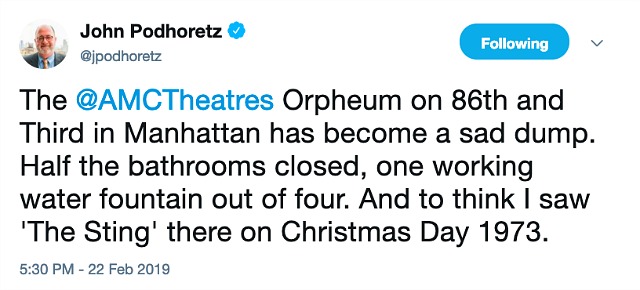
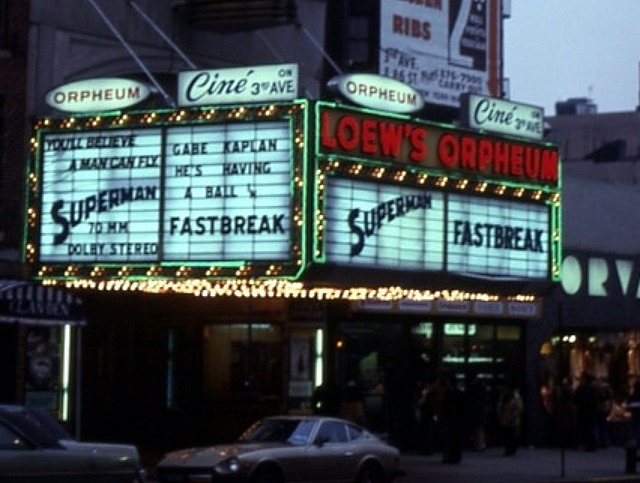
A Coupla Hours Left…
The only Oscar wins I’m 100% solid on are Alfonso Cuaron as Best Director, Rami Malek as Best Actor, Glenn Close as Best Actress, Mahershala Ali as Best Supporting Actor, Regina King as Best Supporting Actress and BlacKkKlansman for Best Adapted Screenplay.
If Roma wins the Best Picture Oscar, fine — quality-wise it occupies the highest rung. But I’ve been predicting Green Book to win for a few weeks now. I’m just presuming that deep down Academy members will vote for the film that they actually like the best, as weird as that may sound in the present political climate. I’ve heard so many say that they found it boring or slow, that the first half is about Yalitza Aparcio sweeping and mopping up, or that they resent the Netflix factor. If it wins, all hail in-house Netflix award-season maestro Lisa Taback. If it doesn’t, there’s always The Irishman next year.
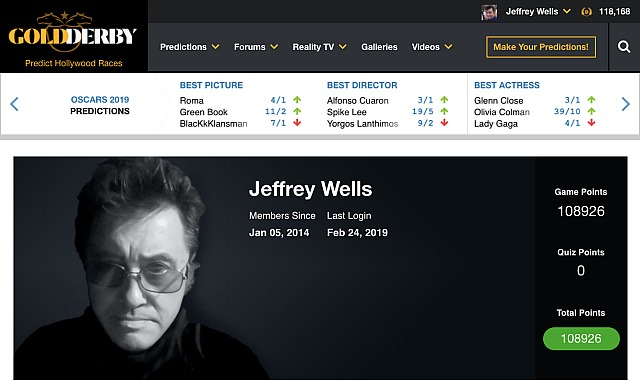
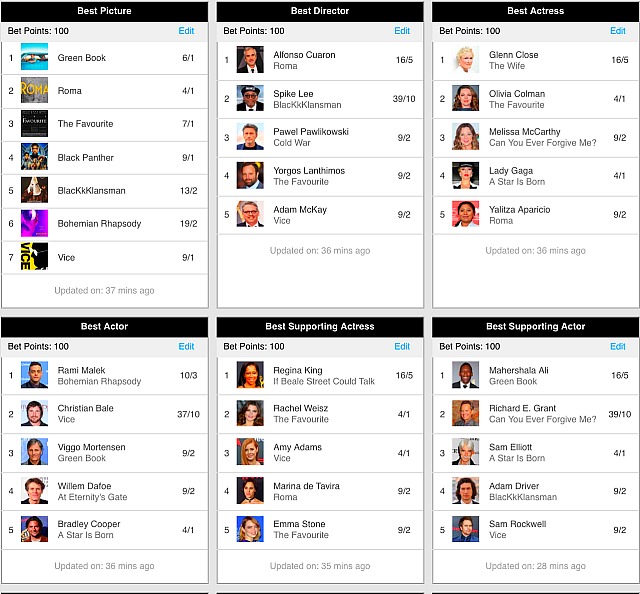
What’s The Primary Impression?
Lawrence Tierney: “I’ll tell you what the primary impression is. The primary impression is how fucking young everyone looks. Buscemi, around 34 at the time, looks like he’s 24, at most. Okay, 25 or 26. Tarantino and Roth, 28 and 30 at the time, could be 22 or 23. I was 72 at the time — I’m fucking dead now — but even I looked pretty good. For an old guy, I mean.”
Anecdote #1: “I attended the Reservoir Dogs after-party at the Majestic Hotel in May 1992 — I was filing for Entertainment Weekly at the time.” Anecdote #2: “I was walking along Blvd. St. Germain with a girlfriend around…I forget but it was probably around ’04 or ’05. Something like that. And suddenly there was Tim Roth at a sidewalk cafe with a lady friend. I’d met him once or twice so I said hello, got into some verbal ping-pong. My girlfriend didn’t know Roth — not a crime in itself — but made the mistake of asking him who he was. Roth’s face darkened. The vibe turned sour. Never ask anyone who they are. It’s better just to smile and say ‘hey’.”
Where The Intrigue Is
Over the last 30 years I’ve lived in two homes that I’ve truly enjoyed and felt proud of. A second-floor Hollywood hills rental at 8682 Franklin that I shared with my ex-wife Maggie and our new-born son Jett between ’88 and ’89, and a 1920s Spanish-style home in Venice that Maggie and I bought ($385K) — 715 Superba Ave., elevated railroad-beam garden, jacuzzi in rear, converted office-garage. I’ve been in the same West Hollywood abode since the ’91 divorce, and the best adjective I can apply is “agreeable” — comfortable, well-furnished, choice location, nice hardwood floors, great wifi, etc.

[Click through to full story on HE-plus]
Spirit Awards Aftermath
Barry Jenkins‘ If Beale Street Could Talk has won the Best Feature Spirit Award, and Jenkins has won for Best Director. Congrats are in order, but at the same time I have to repeat what I’ve known (i.e., not “felt” but absolutely known) in my gut for the last five months, or since catching Beale Street at the Toronto Film Festival: It’s a nice, dreamy, Wong Kar Wai mood piece minus any sort of engaging narrative (certainly not my idea of one) or any story tension to speak of.
As Jenkins’ film strictly adheres to the downish arc of James Baldwin‘s 1974 novel, the film radiates integrity. Which I respect. But I didn’t find Beale Street dramatically satisfying. I can’t imagine how anyone could find it so. I was therefore flabbergasted when the critical community flipped for it.
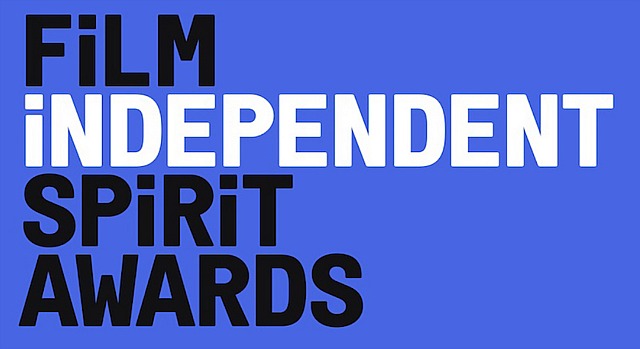
My Toronto review called it “a decent film in a sluggish, warm-hearted, ‘I love you baby’ sort of way. The two leads, Stephan James and Kiki Layne, are highly appealing in all respects, not the least being that they’re physically beautiful. And I agree that Regina King (who plays Layne’s mom) might land a Best Supporting Actress nomination. James Laxton‘s cinematography and Nicholas Britell‘s musical score are probably the two best elements.
“The fact is that Beale Street is all about mood and faith and dreamy lovers giving each eye baths. It has no narrative tension or snap, no second act pivot or third-act payoff or anything in the least bit peppy or penetrating, much less reach-for-the-skies. It’s languid and sluggish and awash in feeling that isn’t pointed at anything but itself. Not a disaster but definitely minor.”

